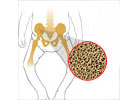The design for a probiotic that could be used to treat inflammatory bowel disease (IBD) has been discovered by researchers.

The researchers have found that this is because an increase in iron levels, which happens during active IBD, inhibits the growth of probiotic bacteria, including Lactobacillus.
Iron levels increase in the intestine during inflammation, bleeding, during stress and when people are taking iron supplements.
Iron is critically important to the growth of most species of bacteria, including pathogens, and its availability is what restricts their growth.
It is well known that pathogens increase growth rate by up to 8,000 times when exposed to increased levels of iron. Lactic acid bacteria are unusual as they have evolved not to require iron, and so do not increase growth rate when exposed to it.
"When we started our study we considered the properties that a probiotic would need to treat IBD," said Dr Tristan Cogan, Research Fellow in the University of Bristol's School of Veterinary Sciences.
Advertisement
"The difficult step was finding a bacterium that had all of the properties that we wanted. Now we have found something that looks like it should work, our next step will be to test the probiotic in clinical trials."
Advertisement
The study then identified a strain, which the academics have patented, that can and showed that it has probiotic and immunomodulatory properties, and can reduce pro-inflammatory responses to pathogens associated with IBD.
The researchers suggest that iron response is the factor that prevents probiotics from being useful in treating disease, and that their bacterium could be a novel probiotic treatment for active intestinal disease.
The study has been published online in the journal PLoS ONE.
Source-ANI















